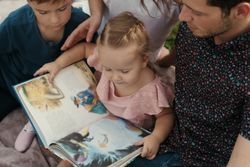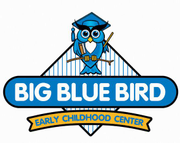How to Read With Your Child at Every Age

Along with building literacy, books help kids learn about feelings, relationships, communication, and problem-solving. Teaching your children these skills from a young age is important. If you’re unsure how to approach this form of early education, use this guide to help you get started.
A Parent’s Guide to Reading With Kids
How to Read With Babies
If your child is under 1 year old, you might not view reading as a priority just yet. However, it’s never too early to introduce your little one to books. Although they may not be able to follow along with the story, babies benefit from hearing new words, as it helps them start to recognize rhythm and language. They also enjoy seeing pictures of faces, toys, trees, and other familiar objects.
Look for cloth or board books that feature textures, flaps, and buttons to stimulate your child’s curiosity. Try reading books meant for kids who are a little older to expose your baby to longer sentences and more complex rhythms. Point to the pictures to help your child connect language with imagery.
How to Read With Toddlers
 Like babies, kids between 1 and 3 years old often enjoy books with textures, flaps, and other sensory stimulation. Now that they’re older, they’ll have an easier time following the story. Read books with simple plots about familiar events, such as going to the park or spending time with family.
Like babies, kids between 1 and 3 years old often enjoy books with textures, flaps, and other sensory stimulation. Now that they’re older, they’ll have an easier time following the story. Read books with simple plots about familiar events, such as going to the park or spending time with family.
Look for books with one or two simple words per page, such as “dogs bark.” Toddlers can learn to repeat these sounds, boosting their sense of independence. When reading a favorite story your child has heard many times, ask your child to point to a particular image. For example, you could ask them to point to the cow or other animals and features on the page.
How to Read With Preschoolers
If your little one is between ages 4 and 5 and is about to begin early education classes, start reading stories with more complex plots that feature problems and solutions. Promote your child’s reading comprehension skills by asking questions about what will happen next. Emphasize emotions by asking your little one how they think the character feels and if they’ve ever felt that emotion.
When possible, compare the character’s experiences to recent events in your child’s life. This strategy helps kids understand their own emotions and develop empathy. To increase their language skills, point out words that rhyme or start with the same letter, and define any words your child doesn’t know yet.
Help your little one become a top-notch reader, by enrolling them at Big Blue Bird Early Childhood Center in Lexington, KY. The center has over 40 years of early education experience. Their infant, toddler, and preschool programs prepare kids for kindergarten by emphasizing creativity, curiosity, and socialization. Learn more about the organization online. Call (859) 299-9277 to schedule a tour.
About the Business
Have a question? Ask the experts!
Send your question

